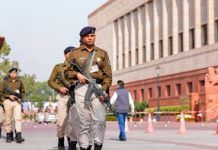Police in J&K’s Kishtwar have appealed to civilians to not wear combat or army-pattern clothing. It has also asked shopkeepers not to stock or sell such clothes as terrorists camouflage themselves in army uniforms to escape scrutiny. According to reports, the police have also asked the youth in the district to use social media to spread awareness and start a campaign to prevent misuse of the Army uniform and equipment.
“The general public is appealed to refrain from wearing Army-pattern or combat clothing while the shopkeepers are advised not to sell such clothing or Army uniform, as anti-national elements or militants use them to pretend as security personnel in order to carry out their evil designs,” the Kishtwar police said in a statement. However, it said traders and shopkeepers interested in selling Army uniforms could approach the local police stations for establishing their business units in approved areas. “The youth is also exhorted to use social media to spread awareness and start a campaign to prevent misuse of army uniforms and equipment so that militants or anti-national elements may not take advantage of such dresses which could lead to major security lapse,” the statement said.
The district, which falls in the Jammu region and had been declared terrorism-free about a decade ago, saw the killing of BJP state secretary Anil Parihar and his brother Ajeet on November 1 last year. Last year itself, in April, senior RSS leader Chanderkant Sharma and his security guard were killed inside a health centre in the district.
Jammu Inspector General of Police M K Sinha had recently said at least ten local terrorists, eight belonging to Hizbul Mujahideen and two affiliated with Lashkar-e-Taiba (LeT), were active in the district. There have been two encounters in the district, in the Marwah area on May 31 and the Keshwan forest on June 21.








